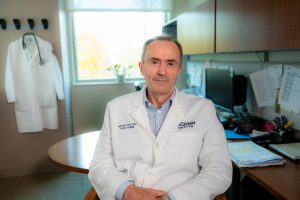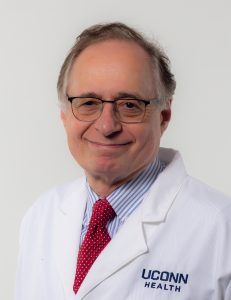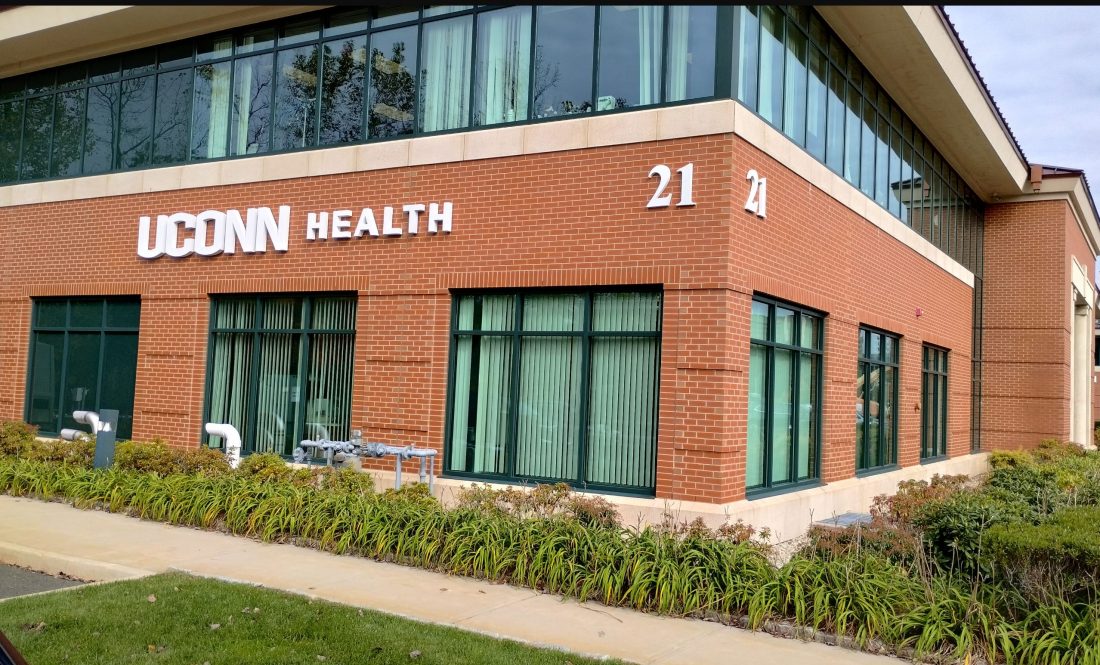On October 23, the UConn Center on Aging moved its clinical services from its location in the Outpatient Pavilion on UConn Health’s main campus to just a short ride down the road at 21 South Road in Farmington. The move provides the opportunity to add a multifaceted subspecialty component to its nationally recognized clinical programs in geriatrics, thus creating a Geriatrics and Healthy Aging Program.

According to Dr. Patrick P. Coll, medical director for Senior Health at UConn Health, geriatrics is a relatively new discipline that has been around for about 50-60 years. Geriatricians are both primary care doctors and aging specialists who have additional training in treating older adults, especially those 65 and up. People in that age range especially those over 80 often have multiple or complex health matters and need specialized care. Geriatric doctors have the training and experience needed to address these issues.
Coll explains geriatrics in relation to pediatrics. “Children have a different physiology and are prone to certain conditions that are more common in children. They present differently with different illnesses. The same can be true for older adults who are also prone to certain conditions and present differently with some of those conditions, diagnosis can be different in an older adult than an adult. And treatment can be very different.”
In Pediatrics, there are 20 board-certified subspecialties and with geriatrics, there is only one board-certified subspecialty which is psychiatry. This new location is a step in the direction of providing geriatrics subspecialty care, a model of care which is well established for pediatrics.
Coll and Dr. George Kuchel, director, UConn Center on Aging and chief, Geriatrics, UConn Health had a vision to provide a high-quality comprehensive care for geriatric patients where the majority of their care involving both primary and subspecialty disciplines can be accomplished in one single location.
The new facility on South Road will include the entire geriatric practice as well as the memory center that previously held offices on the main campus. The space now includes additional subspecialties such as audiology and hearing assessments, endocrinology with an emphasis on osteoporosis, urology focusing on incontinence issues, neurology, podiatry, and vascular surgery. The Geriatrics and Healthy Aging program will include a blood draw station, nutritionists, and a dedicated social worker to help coordinate community services for patients all located on the first floor of 21 South Road, with easy access and free parking. Additional services may also be added.

“This type of facility is new to New England and there are only a handful of places in the country that have tried this model,” says Kuchel. “We hear constantly from our patients and families, that as health care gets more complex, it also becomes much more fragmented with often poor communication between physicians. Bringing together providers from different disciplines who all share the same goals to the same location is an essential first step”.
Geriatric medicine focuses on older adults with complex issues who are taking multiple medications, for multiple diseases, and seeing multiple providers. In creating the new location, Coll and Kuchel focused on providing holistic systems-based care that is both elements of specialty care and primary care.
They also wanted to highlight their passion for health promotion for older adults of all ages. Even in frail and disabled older adults, there is a lot you can do for prevention and to help maintain function and independence. It’s not just about living longer; it’s about adding quality of life to those years.
“This gives us the opportunity to work closely with our colleagues in other subspecialties at UConn Health. We have a long working relationship with psychiatry in the memory center. There are clear benefits in terms of coordinating care when providers from different specialties work together in the same location and that is what we are planning on doing in the new space,” says Coll.
UConn Health is an academic health center, and our research and clinical programs exist to support the academic mission. An important component of this program is to support the education of our trainees who, unless they go into pediatrics, will see many older adults in the course of their clinical careers. It is important that they learn how to provide optimal high quality care for those patients. Nationally there has been a movement in training specialists to develop deep skills at the interface of geriatric care in their own discipline. We will be doing a lot of teaching in this space.
UConn’s Center on Aging, is also the home to the UConn Claude D. Pepper Older Americans Independence Center, one of only fifteen such centers of excellence nationwide. The UConn Pepper Center is pioneering a theme focused on Precision Gerontology, an approach to aging research and the care of older adults that seeks to render interventions enhancing function and independence more effectively through an improved understanding of heterogeneity and more precise targeting.
There is currently a great deal of research in interventions in the field of geroscience targeting biological aging and we are not that far away from seeing it make its way to clinical care.
“What distinguishes UConn is that we are an academic institution, and together the Center on Aging and The Pepper Center are transformational,” says Kuchel.
For more information visit the UConn Center on Aging or call for an appointment (866) 328-8086.



